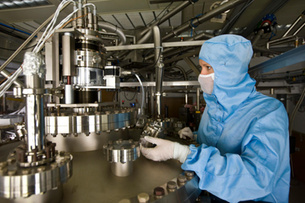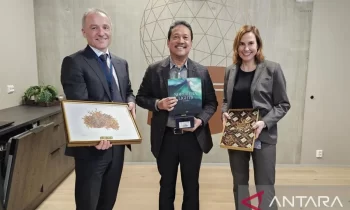
Eine Mitarbeiterin des IBM-Forschungslabors in Rueschlikon im Kanton Zuerich arbeitet am 31. Juli 2008 an einem Rastertunnelmikroskop. Seit 1962 forscht IBM in Rueschlikon, wo heute ungefaehr 300 Mitarbeiter fuer das Unternehmen taetig sind. (KEYSTONE/Alessandro Della Bella)
Two scientists working in Switzerland have won the prestigious Kavli prize for nanoscience, bestowed every two years by Norwegian and American institutions.
Gerd Binnig of the IBM Zurich Research Laboratory and the University of Basel’s Christoph Gerber, as well as their colleague Calvin Quate of Stanford University, were awarded $1 million (CHF990,000) in total for their work on atomic force microscopy. That technology allows scientists to observe how individual atoms are arranged on a surface and manipulate them.
It is the first time Swiss scientists have been honoured with the Kavli prize, which has been given every two years since 2008 by the The Norwegian Academy of Science and Letters, The Kavli Foundation and The Norwegian Ministry of Education and Research. In addition to nanoscience, Kavli prizes are also given for astrophysics and neuroscience.
This year, the astrophysics prize went to scientists from the California and Massachusetts Institutes of Technology for the direct detection of gravitational waves. The neuroscience award was given to researchers from Brandeis University, the Univresity of California at San Francisco and Stanford University “for the discovery of mechanisms that allow experience and neural activity to remodel brain function,” according to the prize committee.
Prize winners will be honoured at a ceremony in Oslo at the same venue that hosts the Nobel prizes.
(swissinfo)



